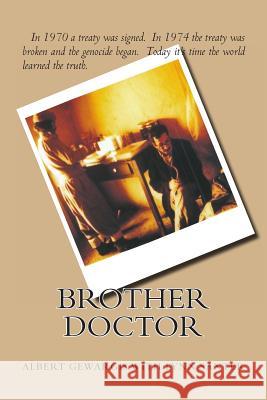Brother Doctor » książka
Brother Doctor
ISBN-13: 9781480182721 / Angielski / Miękka / 2013 / 248 str.
This is a real life story of courage and despair in proportions that eclipse anything you have ever before read - or even imagined. It's a tale of tragedy and triumph against the most brutal circumstances any human being could begin to conceive. And it's a journey of heroism and horror that rivals that most spectacular myths of legend, because every word of it is true. Doctor Albert Arkhim Gewargis was raised in Iraq as an Assyrian Christian. He completed his medical degree in Germany, where he lived on a year-by-year visa until the heinous bombing of the Israeli Olympic team in Munich, 1972. Forced to leave Germany for no other reason than he was a citizen of Iraq, Albert decided to return to his homeland, despite persecution, and despite the fact that he had the opportunity to live in several other countries of the world. With war looming between the Kurds and the Ba'ath Party of fascist Iraq, this brave and dedicated man of medicine gave up everything to help a people who had touched his heart. Don't read this book because you sympathize with the plight of the Kurdish people. Don't even read this book because you condemn the sadistic tyranny of Saddam Hussein's Ba'athist regime. Read this book to be inspired by the endurance and determination of one man who was so dedicated to saving lives that he voluntarily faced squalor and starvation, physical and mental agony, and torment and frustration that would have sent a lesser man insane. The first building Albert was assigned to use as a hospital had previously been used as a stable. Two tons of dung had to be dug out, and DDT saturated throughout the complex to rid it of rats, poisonous snakes, scorpions, and malaria carrying mosquitoes, before he could begin to operate. Often he had no food to eat, and no bed to sleep in. He could have left at any time. Indeed Doctor Gewargis had no obligation to be there in the first place. Yet he remained, moved by the haunting sound of a child singing in angelic tones under sedation as his arm was being amputated, dazed by the ninety year old guerilla who shouted encouragement to his men as Albert treated his gaping wounds without anaesthetic, and crushed when he arrived in a remote area of Iraqi Kurdistan to deal with a measles outbreak only to find seventy freshly dug little graves. He was bombed, he was shot at, and he walked for days to help others until his feet were in bleeding shreds. His story begins over a decade in advance of the grim fate that awaited the Kurdish people of Iraq ... the holocaust known as "Bloody Friday" where Saddam Hussein used his devastating weapons of mass destruction on a simple people who wanted nothing more than to defend their right to exist.
Zawartość książki może nie spełniać oczekiwań – reklamacje nie obejmują treści, która mogła nie być redakcyjnie ani merytorycznie opracowana.











